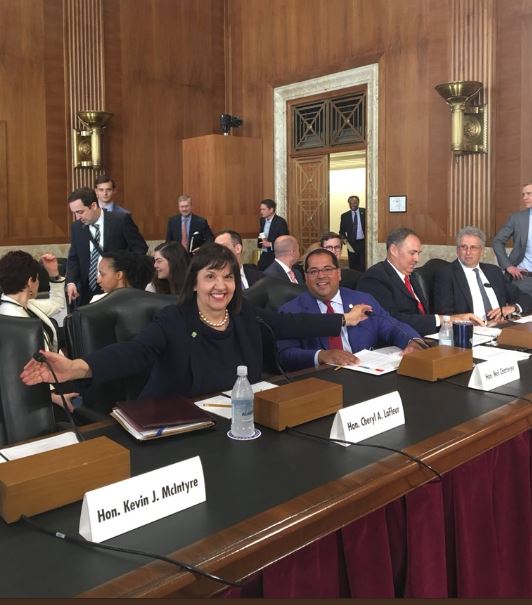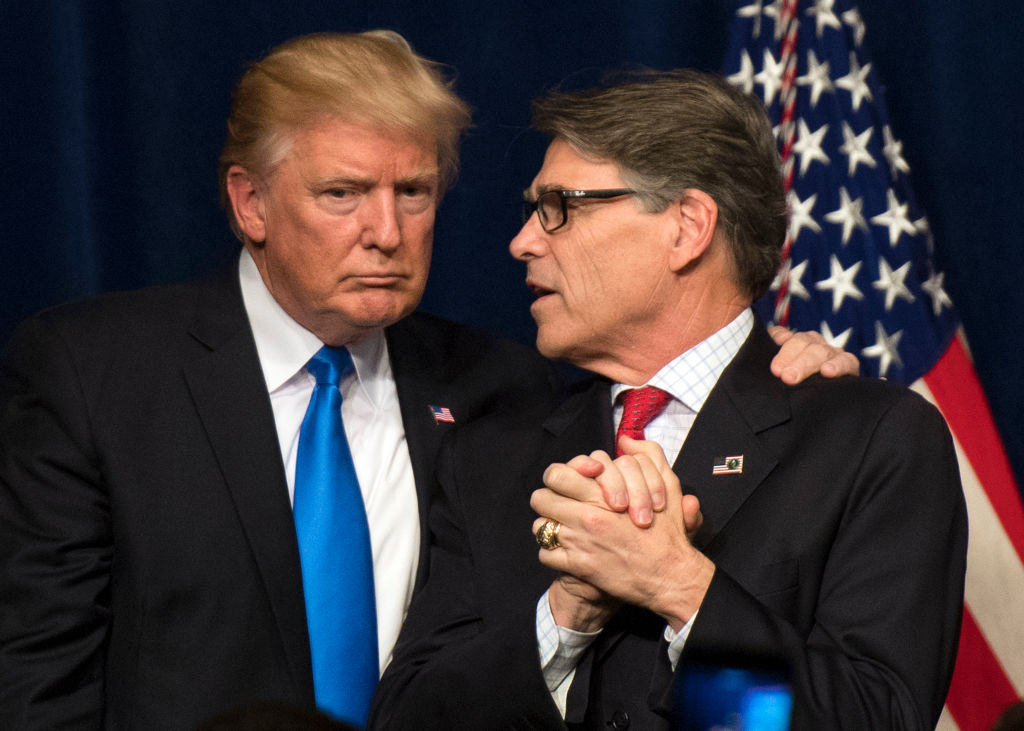A member of President Trump’s own political party is leading the charge at the Federal Energy Regulatory Commission (FERC) against the president’s plan to prop up financially struggling coal and nuclear plants.
FERC Commissioner Robert Powelson, a Republican appointee, did not shy away from expressing his opposition to Trump’s proposal on Tuesday at a Senate oversight hearing. The commission should not be in the business of picking winners and losers in the nation’s wholesale power market, Powelson told members of the Senate Energy and Natural Resources Committee.
“Unprecedented steps by the federal government — through the president’s recent directive to the Department of Energy to subsidize certain resources — threaten to collapse the wholesale competitive markets that have long been a cornerstone of FERC policy,” Powelson said in his prepared testimony.
Powelson, a former state regulator in Pennsylvania, was not alone among his colleagues on the commission in opposing Trump’s proposed bailout. Each of them — three Republicans and two Democrats — do not believe the nation is anywhere close to facing an emergency shortage of electricity supplies to keep the nation’s lights on.
Sen. Martin Heinrich (D-NM), a member of the Senate Energy and Natural Resources Committee, asked the FERC commissioners if the nation’s power markets are facing “an actual national security emergency at the moment,” as declared by the Trump administration.
None of the five commissioners answered in the affirmative.

On June 1, the president ordered the Department of Energy to develop a plan to force grid operators to buy electricity from coal and nuclear plants at risk of retirement, effectively keeping those failing power plants afloat. But Trump’s call to bolster struggling coal-fired and nuclear power plants through the use of a section of the Federal Power Act and the Defense Production Act has been slammed by environmentalists and energy industry groups.
Last month, Powelson warned against using the Defense Production Act to subsidize the continued operation of coal and nuclear plants. Using the law “would be the greatest federal moral hazard we’ve seen in years and something that would be the wrong direction for us to venture down,” Powelson said at a conference.
Since joining FERC last summer, Powelson has remain steadfast in his opposition to the commission moving away from a market approach to determining which power plants operate in certain regions of the country. The first challenge occurred in September when Energy Secretary Rick Perry asked FERC, which oversees the U.S. grid and regulates interstate electricity transmission, to adopt a new federal rule that would require Americans to buy more coal and nuclear power.
By the time long-time energy industry attorney Kevin McIntyre joined the commission as its chairman last December, Powelson had already rallied his fellow Republican commissioner, Neil Chatterjee, to join him in opposing Perry’s proposal.
There was no question that the two Democrats on the commission — Cheryl LaFleur and Richard Glick — would oppose Perry’s plan. In early January, by a vote of 5-0, FERC rejected Perry’s plan.
White House energy ally and coal baron Robert Murray then railed against FERC for rejecting Perry’s plan. Murray said that McIntyre and Powelson were “wrong in their decision” and that it “needs to be overturned.” According to Murray, four of the five FERC commissioners should have been fired for the votes on the Perry plan. Chatterjee, who also voted to reject the plan, should not be fired because he was “overwhelmed” by the other four, Murray said.
Powelson did not appreciate Murray’s criticism. He noted at the time that Murray blamed the “feckless” FERC for not approving the plan to boost coal and nuclear plants. “I challenge Mr. Murray to a debate on CNBC or Fox News,” he wrote in the tweet.
Powelson later deleted the tweet, telling a House panel that it was “inappropriate.”
Despite toning down his criticism of Murray on Twitter, Powelson has not dialed back his criticism of Trump’s attempts to help the coal and nuclear industries.
The Trump administration’s proposed intervention in the nation’s wholesale power market “could potentially ‘blow up’ the markets and result in significant rate increases without any corresponding reliability, resilience, or cybersecurity benefits,” Powelson said Tuesday.
PJM Interconnection LLC, the regional transmission organization that oversees an electric grid serving 65 million people in 13 states, has stated “there is no need for such drastic action” because “there is no immediate threat to system reliability,” Powelson noted.
At Tuesday’s hearing, Powelson’s colleagues on the commission also spoke out against Trump’s plan. Glick acknowledged that fuel diversity and grid reliability are issues that FERC must continue to monitor.
“But we need to be wary of people using the situation or the potential situation as an excuse to achieve market changes they haven’t been able to achieve otherwise,” Glick said.
Trump’s bailout plan, as outlined in a memo leaked to Bloomberg News, could raise electric utility rates by as much as $65 billion, or about $500 more per year for the average consumer, for no added benefit, Glick said in response to questions from Sen. Ron Wyden (D-OR). “It’s clearly going to raise rates,” he said.
“FERC has the responsibility to ensure the reliability and resilience of the grid — and we should take our duties seriously,” Glick explained in his prepared testimony, “but we cannot try to stop the natural evolution of the industry by suggesting that there is an emergency, unless there is evidence to suggest that an emergency actually exists.”



